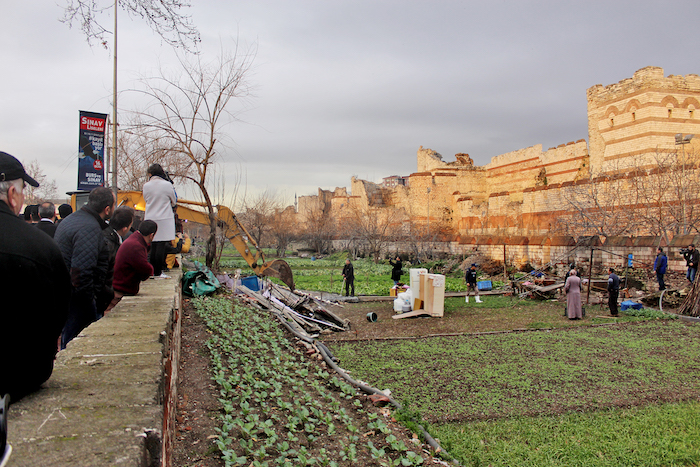Food Versus the Big City of Istanbul
The ILEIA Centre for learning about sustainable agriculture was established in 1984 as a response to the realization that Green Revolution technology was neither sustainable nor feasible for many small-scale farmers around the world. It is an independent organization based in the Netherlands that supports agro-ecological approaches and family farming. Istanbul, like many other cities, is under heavy pressure from urban development projects. In the face of this threat, the DÜRTÜK collective supports small-scale farmers in and around Istanbul by organizing reliable demand for the produce from urban gardens, and by building a supportive community around them. This initiative not only provides urban residents with local and fairly priced vegetables, but is also a line of defense against the destruction of the city's historic vegetable gardens and a space of action in Istanbul's violent, paralyzing atmosphere. DÜRTÜK is the acronym for Producers and Consumers in Resistance (Direnen Üretici Tüketici Kolektifi in Turkish). The DÜRTÜK collective was born in 2015 as common ground between the struggle for urban spaces and the emerging food sovereignty movement in Istanbul. The public looks on as the garden is walled off. Photos: Uygar Bulut Every Monday our collective makes a list of vegetables available from local farmers, sets fair prices, and collects orders from our members. We also talk about the most urgent developments concerning the vegetable gardens, which are under constant threat from urban transformation projects. On Thursdays, we bring the produce to a central district of Istanbul where members can pick up their orders and socialize amongst themselves. Finding common ground
Bostans—an edible heritage While today only a few remain active, historically the bostans of Istanbul helped feed the city. In fact, people depended on these gardens for survival during wars and famines. Today they are considered a nostalgic memory that is irrelevant to urban life. But nothing could be further from the truth. In recent years, bostans have convened people in defense of cultural heritage, the right to the city and urban food production. The Land Walls: Defending and feeding the city
Özkan and around 20 other families make a living by cultivating the moats of the Walls. They are the second or third generation of farmers who have migrated to Istanbul to earn a living. This history of agricultural activity around the Land Walls is deeply tied to the history of the Walls, which dates back to the fifth century. As such, the Walls and the bostans together represent great urban know-how about both defending and feeding the city. Gardening continues to be the most consistent activity in the moats and around the walled zone. Although this is keeping the area lively and productive, it is neglected both as a means to conserve the area and as cultural heritage. In recent years some of the very old and active bostans in the same area, known as Yedikule Bostanları, were destroyed by the municipality to make way for a park that will serve the surrounding gentrifying neighbourhoods. The Mosque Garden: Threats and resistance
One active but endangered bostan of Istanbul is Piyalepaşa Camii Bostanı (Piyalepaşa Mosque Garden), which was supposed to become a car park in 2013. Mehmet and Cemile, a couple in their 60s, struggle to keep the bostan going in the middle of the rapidly transforming center of Istanbul. The bostan's history is closely related to that of the mosque, having been a source of income for the mosque since the 16th century. An unlikely alliance of activists, lawyers, archeologists and historians stood up for its protection, and succeeded. Not only was Piyalepaşa Camii Bostanı saved from becoming a car park, it was also registered as a historical heritage landmark in 2015. This has been an exemplary case in Istanbul of how agricultural land can be recognized as cultural heritage. But the municipality and associated construction companies are continuing to put pressure on Mehmet and Cemile to move somewhere else. The latest rumor is that the bostan will be turned into a hobby garden for the municipality so that they can make a profit from it. The near future of this bostan is uncertain for other reasons as well. Mehmet and Cemile are old and they do not have enough strength to cultivate all their land. Because of the low prices of agricultural produce, and the equally low social status of farming in Turkey, their children do not have an interest in keeping the business going. No recognition, no security Moreover, despite the fact that the farmers have been cultivating their land for generations, their land tenure is insecure and they can be evicted at any moment. The land they cultivate is not considered agricultural land so they cannot formally register as farmers. This means that they are not recognized in agricultural policies and don't get access to public social security programs. Cultivating hope The weekly routine of DÜRTÜK's meetings represents hopeful, common ground for gardeners, farmers, consumers, activists and other citizens to exchange experiences about how they cope in their precarious situations, and to support each other. At DÜRTÜK, the urgent need to save and to defend agricultural spaces meets the humble labor of cultivating and reproducing everyday life. Sevgi Ortaç (durtukgirdibostana@gmail.com/sevgiortac@gmail.com) is a member of DÜRTÜK, a visual artist and a researcher, born and living in Istanbul. https://www.facebook.com/durtuk/
top | Newsletter Home |Table of Contents| Archive |



.jpg)
